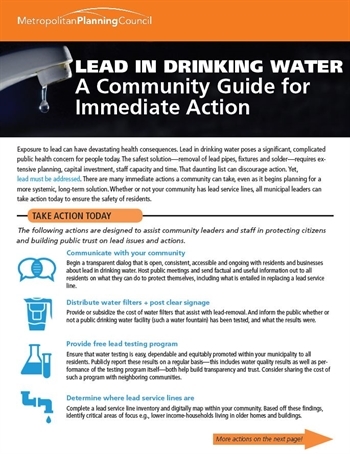Lead in drinking water: MPC is taking action and so can you
This blog is part of a series of blog posts exploring solutions to the complicated issue of lead in drinking water.

There are many people around the country worried about whether or not their drinking water is safe today. I can understand why it is disconcerting—news articles from the New York Times to the Chicago Tribune and Sun Times are reporting on the issue of lead in drinking water.
While federal Congress finally banned the use of lead pipes to convey drinking water in 1986, it did not require remediation of this toxic material. Because of this, lead pipes, fixtures and solder will remain a public health concern so long as this legacy material remains in use.
It’s time to get the lead out
The risk to our health is too high. Lead pipes are too common. The moment is ripe. It is time to remediate lead from our drinking water infrastructure.
On Tuesday, October 30, 2018, MPC hosted its first Roundtable on this topic. Titled Lead in Drinking Water: It’s Time to Get the Lead Out, this event featured special introductory remarks by Illinois State Senator Heather Steans who underscored the need to attend to this issue in our communities. Darrell King, Water Production Bureau Chief for the City of Evanston, and Nancy Quirk, General Manager of the Green Bay Water Utility, shared how their communities are moving forward with multiple initiatives for getting lead out of drinking water systems. And Executive Director of the Illinois Finance Authority, Chris Meister, shared how federal and state agencies are working to streamline loan programs for lead service line replacements.
The event underscored the complexity of fixing this issue—ownership, responsibility, identification and cost of replacement all pose barriers. A lack of regulatory clarity and direction is also missing to assist water managers in taking action—these experts must be at the table to ensure prudent, appropriate policies are put forth to help communities. Yet regardless of these complications, lead in drinking water is a public health risk and needs to be addressed today. We applaud all the municipalities in our region and around the country who are taking action!
Important considerations for getting lead out
MPC was recently asked to testify before the City of Chicago’s Finance Committee regarding new ideas for generating revenue to help pay for remediation. Finding multiple, feasible funding streams to upgrade our drinking water infrastructure will be necessary, and so are the following:
- Recognizing that municipalities, water utilities and property owners all have a responsibility and duty to work together in addressing this issue.
- Inventorying and mapping where and just how many lead service lines exist, and prioritizing remediation—beginning with those at greatest risk.
- Understanding that replacement of all lead service lines does not guarantee the risk of lead exposure is removed. Buildings might still have old fixtures or solder that contains lead, which will require improved education to assist property owners and renters.
- Finally, it is imperative to provide equitable assistance to lower income households (often times the citizens who face the greatest risk of lead exposure), so programs must be designed to deliver more resources to low-income households and disinvested communities. Likewise, comprehensive solutions that address affordable housing and rental properties, as well as non-residential buildings, such as schools and parks, will be critical.
Steps you can implement today

Remediating lead infrastructure from our drinking water systems is a daunting task. However, there are many immediate actions both communities and individuals can take to get started.
- If you’re a community leader or staff member, this two-page guide outlines actions designed to increase safety, build public trust and ultimately get your community started on a path toward getting the lead out.
- Read our exciting Drinking Water 1-2-3 guide to better understand drinking water systems, how they are managed and what the important practices are to ensure safe and sustainable supplies now and into the future. It’s full of images, graphics, statistics, and case studies.
- If you’d like to hear about how some cities have dealt with this issue, and how experts are considering funding lead service replacement, Check out the recording of our Roundtable event—and help us spread the word by sharing it with your networks.
- Finally, check out the first blog in our new series on the topic of lead in drinking water, and stay-tuned for more posts!
Whether you’re a resident, elected official, water system operator or regulator—we all have a role to play in making sure our incredible drinking water infrastructure systems remain safe and sustainable now and into the future. Don’t be daunted by the news—there are prudent, sensible steps and solutions each of us can take to reduce exposure to lead in our drinking water.
